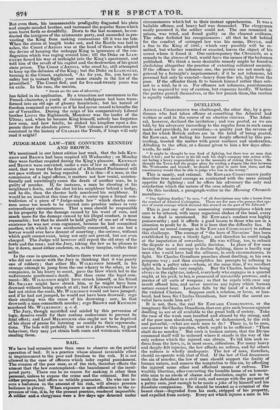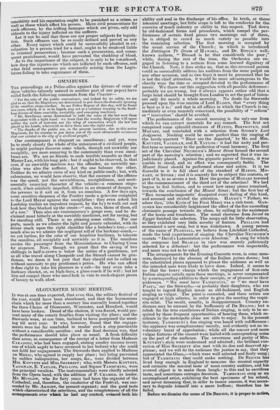DUELLING.
ADMIRAL CODRINGTON was challenged, the other day, by a gen- tleman who had taken offence at something the Admiral had written or said in the course of an election canvass. The Admi- ral, however, declined the invitation ; and was posted, as we are told, by his adversary (according to the regular form in such cases made and provided), for cowardice,—a quality just the reverse of that for which British sailors are in the habit of being posted. Sir EDWARD, not feeling his honour deeply affected by this pro- ceeding, treated the matter with great coolness and moderation. Alluding to the affair, at a dinner given to him a few days after- wards, he said- " It might be thought he was fond of fighting, but there was no man that liked it less; and he never in his life took his ship's company into action with- out feeling a heavy responsibility as to the necessity of risking their lives. He thought the Town-hall the proper place for settling a dispute like that between Mr. Woolcombe and himself: he should be glad to meet him there, and the constituency would then be able to judge who was in the wrong."
This is manly, and rational. Sir EDWARD CODRINGTON justly describes true moral courage as contrasted with the mere animal appetite for fighting ; and he offers his adversary the only real satisfaction which the nature of the case admits of.
On this incident, a paragraph-writer in the Morning Chronicle moralizes- " Our fighting dandies," he says, "of all descriptions may take a lesson from. the conduct of Admiral Codrington. There are few men who possess that spe- cies of moral courage which dictated this avowal on the part of Sir Edward."
This is just one of those unmeaning commonplaces which are sure to be uttered, with many sagacious shakes of the head, every time a duel is mentioned. Sir EDWARD'S conduct was highly
praiseworthy ; and it affords a good lesson to those who are in a situation to profit by it. But it is here that the difficulty lies. It
required no moral courage in Sir EDWARD CODRINGTON to refuse this challenge. The courage of "the hero of Navarino " has been established by many a bloody fight; and therefore he could laugh at the imputation of cowardice. He was willing, too, to submit the dispute to a fair and public decision. In place of few men having the moral courage to decline fighting, there is hardly any man who would have had the silliness, in such circumstances, to fight. Sir Charles Grandison preaches about duelling, in his own pompous way ; and then exemplifies his precepts by refusing to fight with a paltry rake—whom, at the same time, if we recollect aright, he handles very roughly. But Sir Charles, besides being always in the right (as, indeed, everybody who engages in a quarrel ought, at his peril, to be), is possessed of irresistible prowess, and a master of all sorts of weapons ; so that he repels with ease any insult offered him, and never receives any injury which human nature cannot bear. Lovelace falls by the hand of a relation of the violated Clarissa. Suppose such a relation, or lover, or hus- band, had been Sir Charles Grandison, how would the moral no- velist have made him act?
It is not, then, the real Sir EDWARD CODRINGTON, or the imaginary Sir Charles Grandison, that can give such lessons against duelling as are at all available to the great bulk of society. Take the case of the weak man insulted and abused by the strong, and of the poor man slandered, oppressed, or dishonoured, by the rich and powerful,—what are such men to do ? There is, to be sure, one answer to this question, which ought to be sutficient : "Thou shalt do no murder." But such is human nature, that the Divine command itself will be unheard where it stands in the way of the only redress which the injured can obtain. To bid him seek re- dress from the laws, is, in most cases, ridiculous. For many heavy and deeply-felt injuries, the law affords no redress, and for others the redress is wholly inadequate. The law of man, therefore, should co-operate with that of God. If the law of God denounces the sin of murder, the law of man should support the frailty of human nature, and remove the temptation to this sin, by affording the injured some other and effectual means of redress. The wealthy libertine, after converting the humble home of an honour- able man to an abode of shame and desolation, ought not to be made the defendant in a civil suit, and escape with the payment of a paltry sum, just enough to be made a joke of by himself and his dissolute companions. He should be treated as a criminal of the basest class—degraded from his rank, stripped of his property, and expelled from society. Every act which injures a man in his seniibility and his reputation ought to be punished as a crime, as well as those which affect his person. Mere civil prosecutions for such offences, by the trifling damages which are given, only add ridicule to the injury inflicted on the sufferer. Let it not be said that these are not proper subjects for legisla- tion. Such offences can be as easily defined and proved as any other. Every injury which could be successfully pleaded in ex- culpation by a person tried for a duel, ought to be rendered liable to criminal prosecution; because such a prosecution, and conse- quent punishment, would have prevented the shedding of blood. As to the importance of the subject, it is only to be considered, how deep the injuries are which are inflicted by such offences, and what fatal consequences are constantly arising from the Legis- lature failing to take cognizance of them.



























 Previous page
Previous page